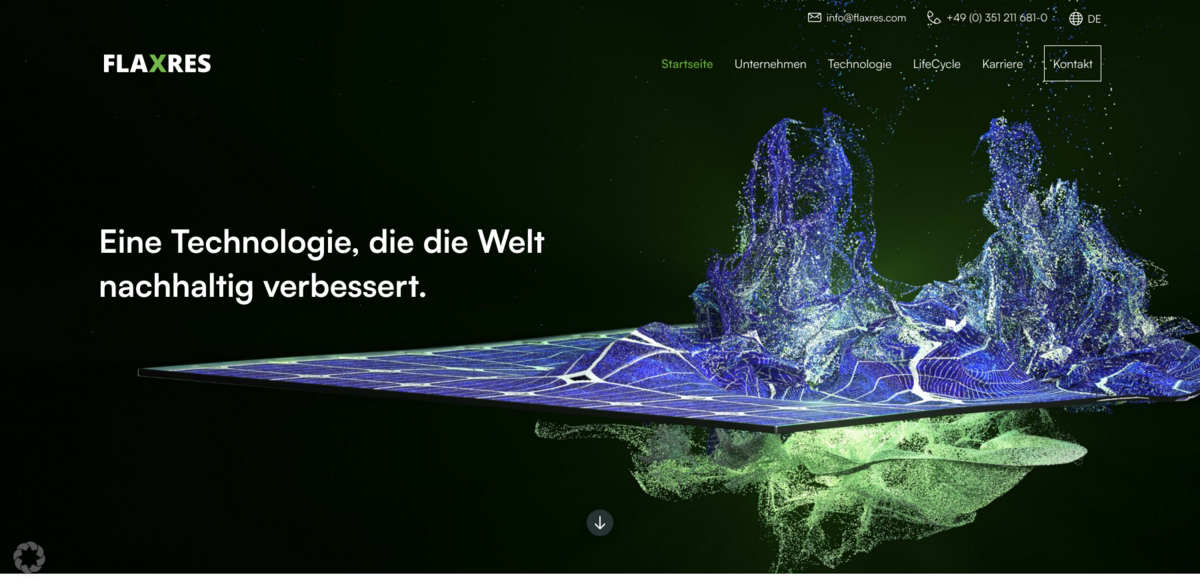What is the FLAXRES Project?
FLAXRES is a technology company on a mission to revolutionize the recycling of composite materials, especially photovoltaic (PV) modules. Their innovative process uses high-intensity light pulses—think of it like a powerful camera flash—to cleanly separate PV modules into their main components. This method heats the light-absorbing layers rapidly to several hundred degrees Celsius, causing the materials to expand and separate at their interfaces. The result? High-quality materials that can be profitably fed back into the material cycle, setting a new standard in photovoltaic recycling.
Main Benefits of FLAXRES Technology
Here’s what makes FLAXRES stand out:
- Extremely Fast: Each module is processed in about 60 seconds, with a goal to slash that down to just 10 seconds.
- Without Chemicals: No hazardous substances involved—clean and green.
- Energy Efficient: The process is economical, saving energy compared to traditional methods.
- Mobile: Their systems can be deployed globally, exactly where demand arises.
Addressing the Growing E-Waste Challenge
In industrialized countries, electronic waste piles up to a staggering 50 million tons annually. Existing recycling methods often fall short—they’re either too costly or don’t recover materials comprehensively. FLAXRES tackles this head-on with a chemical-free process that fully recovers all materials, enabling their return to production. This is especially crucial as the number of defective or repowered photovoltaic modules surges. For example, Germany alone expects around 400,000 tons of PV waste by 2030, roughly 20 million modules. FLAXRES’s approach offers a genuine circular economy alternative to the usual “downcycling” where materials lose value.
How FLAXRES Sees Itself
FLAXRES isn’t your typical recycling company. Instead, it positions itself as a technology provider offering the rough dismantling of composite materials like PV modules as a service. They don’t accept modules directly and don’t hold a first acceptance license for electronic waste. Their focus is on delivering fast, clean, and efficient technology that partners can use to handle recycling more effectively. The process is fully automated with mechanical steps before and after the light pulse treatment, ensuring smooth operation.
Versatility and Sustainability at the Core
The variety of photovoltaic modules out there is huge, but FLAXRES’s technology handles them all—silicon-based or thin-film, big or small, with intact or broken front glass. Sustainability drives everything they do. The cleanly separated materials—glass, aluminum, and silicon—are of such high quality that they can be fed back into the production cycle, forming the basis for new PV modules. While economic processing options for the polymer foils aren’t available yet, FLAXRES is actively working on solutions. This commitment to genuine recycling is what sets them apart.
FLAXRES’s Impact on Sustainable Development Goals (SDGs)
- SDG 7: Affordable and Clean Energy – by promoting recycling of photovoltaic modules, supporting renewable energy sustainability.
- SDG 9: Industry, Innovation, and Infrastructure – through pioneering new recycling technology and industrial processes.
- SDG 12: Responsible Consumption and Production – enabling a circular economy by returning high-quality materials to production.
- SDG 13: Climate Action – reducing waste and energy consumption in recycling processes.
- SDG 15: Life on Land – minimizing environmental impact by avoiding hazardous chemicals and reducing landfill waste.
Looking Ahead: Mobile Systems and Market Entry
FLAXRES plans to roll out its first five production systems in 2024. These won’t be sold outright but rented on a monthly basis, allowing for flexible, demand-driven deployment worldwide. This mobility means recycling can happen right where it’s needed, cutting down on transport and logistics emissions. It’s a smart, scalable approach that could change how photovoltaic recycling is done globally. Just another photovoltaic module… now recycled, broken down into five main fractions: glass, aluminum, polymers, cables & connection boxes, and the valuable solar cells. The future of PV recycling is here—and it’s bright.






















